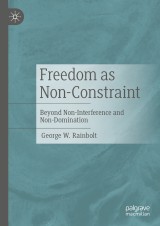Details

Freedom as Non-Constraint
Beyond Non-Interference and Non-Domination|
117,69 € |
|
| Verlag: | Palgrave Macmillan |
| Format: | |
| Veröffentl.: | 08.07.2024 |
| ISBN/EAN: | 9783031611810 |
| Sprache: | englisch |
| Anzahl Seiten: | 224 |
Dieses eBook enthält ein Wasserzeichen.
Beschreibungen
<p>When is a person free to do something? The focus of much of the recent work on this question has been the debate between those who defend freedom as non-interference (aka liberals) and those who defend freedom as non-domination (aka republicans). This book defends a new answer to this question, freedom as non-constraint. According to freedom as non-constraint, both interference and domination cause unfreedom, both human and natural constraints cause unfreedom, and both controlled and uncontrolled interference cause unfreedom. Compared to liberal and republican theories, freedom as non-constraint provides a better account of systemic and structural threats to freedom, a better picture of how market forces and governments impact freedom, and a better understanding of how the natural world constrains freedom. Freedom as non-constraint also provides a new account of the scalarity of freedom and points to the limits on our ability to measure freedom with precision.</p>
<p>Chapter 1. Introduction.- Chapter 2. Human and Natural Constraints.- Chapter 3. Interference and Domination.- Chapter 4. Control.- Chapter 5. Degrees of Freedom.- Chapter 6. Measurement.</p>
<p>George W. Rainbolt is Professor of Philosophy at the University of North Florida (USA), where he has also served as Dean of the College of Arts and Sciences. He is the author <em>of The Concept of Rights</em> (Springer 2006).</p>
<p>When is a person free to do something? The focus of much of the recent work on this question has been the debate between those who defend freedom as non-interference (aka liberals) and those who defend freedom as non-domination (aka republicans). This book defends a new answer to this question, freedom as non-constraint. According to freedom as non-constraint, both interference and domination cause unfreedom, both human and natural constraints cause unfreedom, and both controlled and uncontrolled interference cause unfreedom. Compared to liberal and republican theories, freedom as non-constraint provides a better account of systemic and structural threats to freedom, a better picture of how market forces and governments impact freedom, and a better understanding of how the natural world constrains freedom. Freedom as non-constraint also provides a new account of the scalarity of freedom and points to the limits on our ability to measure freedom with precision.</p>
<p><strong>George W. Rainbolt</strong> is Professor of Philosophy at the University of North Florida (USA), where he has also served as Dean of the College of Arts and Sciences. He is the author <em>of The Concept of Rights</em> (Springer 2006).</p>
<p><strong>George W. Rainbolt</strong> is Professor of Philosophy at the University of North Florida (USA), where he has also served as Dean of the College of Arts and Sciences. He is the author <em>of The Concept of Rights</em> (Springer 2006).</p>
Provides a more accurate description of systemic and structural threats to freedom than leading theories offer Argues that freedom is neither non-interference nor non-domination, but non-constraint Stakes out innovative third alternative to republican and liberal theories of freedom

















